#these are all good and necessary and essential to a fulfilling life
Text
i love cheating on exams i love abortion i love autism i love “unhealthy” food i love vaccines and ugly clothes and sex changes amen
#these are all good and necessary and essential to a fulfilling life#trans#lgbt#womens rights#actually autistic#top posts#?#20k#wtf how did this get popular#30k#40k#45k#50k#60k#70k
74K notes
·
View notes
Text
mini love report — scaramouche

relationship health diagnosis — 50%*

symptom one — deeply insecure
for all his bravado, scaramouche is acutely aware that he's unpleasant to be around. he'd ask if you hit your head recently after hearing your confession. initially, he regarded you with suspicion (and loathing, that's what this churning in his stomach has to be). his beauty has been praised for centuries. traditionally, when his admirers draw closer, they're put off by his brutal honesty. he subjected you to the same treatment. instead of running for the hills like you probably should've, you stuck around. he compared you to a 'cockroach infestation.' very charming.
beneath this veneer of vitriol, he's internally panicking. he's irritable when you're around and wretched when you aren't. his underlings don't know which is worse. he was at a loss when he realized you genuinely weren't bumbling back into his life for his appearance or status. seriously, what is wrong with you? it'd be easier to understand if you had some grand ambition in mind, using him as a means to an end. without this excuse to hide behind, he feels... vulnerable. uncomfortably so.
everything he gets attached to is taken from him. he's forgotten, abandoned, discarded when his worth is found lacking. you could find someone else. someone kind, open, and warm. someone who isn't him. it's terrifying, a thought that makes his skin writhe. especially since, should this premonition come to pass, even he doesn't know what havoc he'd wreak...
symptom two — clingy
once scaramouche likes you, you're his person. not even in a strictly possessive sense (although there's plenty of that), but you're essentially all he's got. he's around more often than he isn't. he insists that without him, your 'stupidity would do you in,' so he considers his hovering a 'necessary evil.' this is for your sake! strictly yours. not his, no, whatever gave you that idea? a bit presumptuous, don't you think?
his habit of acting as your second shadow relates to his aforementioned insecurity. whether he realizes it or not, he's always trying to prove his worth to you. tasks you mentioned dreading will find themselves completed, he'll drag you outdoors if you've been overworking yourself, and he silently sits freshly cooked meals beside you. he once cut vegetables into heart shapes, only to feel so embarrassed, that he diced them into a dusty substance.
symptom three — unconditionally supportive
so long as it doesn't take you away from him, he'll help you accomplish anything you want, good or bad. this is what could come to him most naturally. he loves the thought of you relying on him. it makes him feel wanted, like he's fulfilling a role no one else could in your life. it doesn't have to be material items either. if you're struggling with an issue and come to him for advice, he's noticeably pleased, like a cat that got the cream. you sought him out, you value his input.
he excels at putting together plans and breaking them into doable steps. next-level executive function. you might not want to consult him if you've gotten into a disagreement with a friend, but if you're struggling to know where to get started on a project or goal, he's got you covered. he'll wave off any of your doubt, flicking you on the forehead and grumbling that 'it's doable, just leave it to him.'

primary area of concern
scaramouche views the world from a bitter lens. whereas some try to see the best in others, he sees the worst. this skepticism that's built up over centuries isn't going to disappear overnight. he'll make assumptions about your behavior that aren't necessarily true. he won't come outright and tell you his concerns either, the idea is foreign to him. it ends up falling on you to dispel his misconceptions, which can be an exhausting endeavor.
integrating him into your life proves to be a challenge as well. he can fake a sweet, friendly personality, but he'd only do that for interactions he sees value in. namely, leaving a good impression on your parents/any seniority figure whose approval is meaningful to you. he isn't trying to build a real connection, he just knows it'd be advantageous to win over those who you could you against him. he has no qualms about manipulating them either. he'd do this outside of your purview so you remain none the wiser.

prognosis
it isn't a smooth road. there'll be times where his words cut deep and his involvement in your life feels suffocating. he isn't sure what he's doing and it shows. however, when he extinguishes the light in your eyes, he stills his traitorous tongue. the guilt gnaws at him incessantly. it's a self-fulfilling prophecy on his part — by fearing that he can't make you happy, he's more susceptible to doing just that. should you stick around, this loop isn't destined to repeat forever. his trust in you will build. it's a fragile thing, sown in soil unconducive to growth. be tender in your nourishment and the roots will coil themselves around you.

*the universe has tried (and failed) to wrench you apart (0-20) your friends are praying that you'll break up (21-40) 'well it could/has be worse' bargaining mindset (41-60) a lil messiness as a treat (61-80) pure and wholesome (81-100)
#all that being said. it's still worth it though#mini love reports#scaramouche x reader#genshin impact x reader#scaramouche brainrot#valentines 2024 event
537 notes
·
View notes
Text
Goyim non Muslim/Arab/Palestinians who are trying to help with the situation have to understand this:
Reading one book. Reading 3 news articles. Reading even three scholarly articles. Watching the news every day. Even doing ALL OF THESE THINGS EVERY DAY since 10/7—this is nothing more than a drop in the bucket of the work you need to be doing to contribute to conversations about this conflict, let alone leading any kind of charge.
I have been intimately aware of the conflict and it’s intricacies since I was seven years old. I have been learning and unlearning things my whole life. I am Jewish and pro-Palestine and have spent my adult life learning about Palestinian needs as well as combatting pervasive propaganda from extremists on BOTH SIDES meant to confuse newcomers to the situation like most of you are.
It is, honestly, entitlement that makes you think you can’t waltz into a complex situation involving a 2,000+ year old conflict, multiple identities of non-western origin, multiple cycles of extremism and expulsion and ethnic cleansing and wars from all sides—and take the lead on any of this. You can’t. You don’t know enough. You don’t even know enough to know what you don’t know or how to tell if what you know is wrong.
That doesn’t mean you aren’t necessary for helping to solve this conflict. It means a lot of people are being more vocal than they have any right to be about a situation they know almost nothing about. And they’re doing it so they can feel morally righteous and on the right side and like they’re helping.
But if you actually want to help rather than just looking or feeling like you’re helping, then you need to listen to affected groups when they are speaking. You need to not declare either side right or wrong. You need to learn the difference between terrorism and activism. You need to understand the impact of your words on Muslim, Palestinian, Arab, Jewish, Israeli, and even south Asian communities who are constantly roped into the conflict by racists who just hate all brown people.
You need to learn about the foundations and warning signs of antisemitism. You need to learn about the same about Islamophobia. You need to be open to being wrong. A LOT. Because you will be. Because this conflict is complicated and even those of us who have been in it forever learn things and have to revise our opinions and stances. You need to not assume you are correct about anything and you should have reliable sources for anything you add to this conversation.
You outnumber ALL OF US. You outnumber everyone who is actually affected by the conflict by A SUBSTANTIAL AMOUNT. And your job should be to focus your efforts on FINDING A PATH TO PEACE. Move the conversation away from the personally fulfilling but globally damaging good guys v bad guys narrative. Move it towards a mutually beneficial peace agreement that keeps both Jews and Palestinians safe and protected and equal in their shared homeland.
This is not a Western European-American Christo-centric conflict. Stop applying your principles to it. Start considering that marching, calling senators, and calling for more or less bombs to happen to the “right” people isn’t helping. It’s not helping. You’re not helping.
What will help is listening to people who are actively working to achieve peace. Listening to concerns about ongoing attacks against Israeli civilians during ceasefire. Listening to ongoing segregation of Palestinians and depravation of essential resources from Palestinian Territories. Learn about the official political history of the international community with Israel and Palestine and what the motivations of EACH NON-I/P COUNTRY might have been over the course of Palestine’s 2000yo history. Learn how that might still influence modern western nations today. Learn about Jewish diaspora. Read about counterterrorism and propose or spread awareness of methods and means that can both protect Israeli and Palestinian civilians and defang or eliminate antisemitic or Islamophobic extremists and terrorists. Look for organizations devoted to SHARED PROSPERITY FOR PALESTINIANS AND ISRAELIS.
Furthermore, anyone who tells you that the conflict is simple or repeating a phrase over and over is simple or tells you there is an obvious good answer is at best uninformed but is most likely operating in bad faith. Their “simple” answer isn’t something every world leader ever has magically overlooked. It is one of the routine, recurring “solutions” that depend upon the disenfranchisement, death, or displacement of an affected population that they deem unworthy of consideration.
Israelis aren’t going anywhere. Palestinians aren’t going anywhere. Both populations deserve safety. Both populations’ religions and cultures deserve equality and, yes, explicit constitutional guarantees that they will have their religious and cultural practices respected and protected from violence or suppression. That may not fit with your modern secular ideas that having any guarantees for any religion in a constitution is inherently evil.
But we are dealing with two groups who have been brutalized to near extinction on the grounds of their religion and culture for millennia so consider that asking for guaranteed safety in writing is a pretty reasonable thing to want for everyone, actually.
#I/p#i/p conflict#peace#activism#jewish muslim solidarity#western activists have main character syndrome#stop it#antisemitism#islamophobia#I dare a goy to reblog this challenge#critical reading#cite your sources#history#israel#Palestine#jumblr#Zionism#anti zionisim#racism#bigotry#ethnic cleansing#ID yourself as a goy if you rn and are goy#cuz I feel completely abandoned tbh
134 notes
·
View notes
Text
*puts on my anakin apologist hat again* anakin as double-agent of the Force

The force created Anakin specifically to be the Chosen One (demi-god) bc it needed an INHERENTLY GOOD PERSON who was both powerful enough to learn and withstand the DARK SIDE and powerful enough in his inherent goodness to RETURN FROM IT.
It couldn't have been anyone else BUT Anakin. It had to be the most powerful force user in the galaxy who was so good his soul would withstand (& survive under) the Dark Side he was destined to shoulder for decades.
In order to full the Prophecy, Anakin had to essentially survive both years of torture (borne of the Dark side) and survive the GRIEF AND REGRET from falling (borne of the Light) without completely losing or giving up on himself and submitting to the Darkness eternally.
Someone weaker in the Force could never accomplish this because if they fell they wouldn't be strong enough in the Light of the Force to withstand a fall & return. they'd just fall. Essentially the Force, by creating Anakin, is saying no one else could have done it - not Yoda, not Obi-wan, no other Jedi, or person, or Sith. Only Anakin.
Anakin was essentially a "double-agent" of the Force. Unknowingly.
Padme was always right. There was good in Vader. She saw the truth. Obi-wan also eventually saw the truth, seeing good in Vader (perhaps eventually realizing it was Anakin mercifully freeing him from guilt in OWK), causing him to sacrifice himself in peace for Vader's destruction & Anakin's assured return.
The Force created Anakin specifically to fulfill the Prophecy of falling in both the eyes of the Jedi and Sith because it knew that his inherent goodness would remain in tact enough for him to destroy the Sith (Sidious), not claim the Dark throne for himself afterwards, and also hand control over to the Light (Luke).
BECAUSE he felt GUILT STRONGLY ENOUGH (his goodness) after ALL THAT TIME (20yrs) BURIED IN THE DARK (necessary as per the force to get palpatine in a vulnerable spot) to STILL RETURN TO THE LIGHT afterwards (by killing him Palps/saving Luke).
The Force put him in the hardest possible position because it KNEW that no matter what the dark could throw at him:
ANAKIN WOULD SURVIVE AND PULL THROUGH BECAUSE HIS true ALIGNMENT WITH THE LIGHT (as a demi-god) WAS THAT STRONG.
Anakin was a demi-god created to fulfill a Prophecy and was tortured and misunderstood for this by everyone, including himself, which is what absolved his human half and allowed him in the end to become a Force Ghost. He didn't see himself as a demi-god with free reign to create chaos. And thus he felt genuine guilt for his crimes.
He accepted culpability for them (despite being predestined) which is what makes him a tragic hero. It doesn't matter if it was a prophecy or destiny, if he could help it or not, Anakin still feels regret.
His genuine guilt for his misdeeds & evil and his acknowledgement of them in the end yet again proved what the Force knew to be true. Anakin is inherently good.
Through his young life Anakin didn't say "hey I'm a demi-god I can do whatever I want" he fought the Prophecy for a very long time. He longed to be a Jedi and dreamed of helping others.
Yet, when he confronts Padme on Mustafar he says exactly that! Exactly what an all-powerful god turned to the dark would say. "We can rule the Galaxy. Make things the way we want them to be," going mad for a moment with power. But then he mourns and regrets his fall for the rest of his life (even as Vader he mourns Padme, spares Reva, absolves Obi-wan, he is struck silent & numb by slavery in the Empire in the comics). With his guilt, he returns from the dark as predicted.
This, as per the Force, proves Anakin was good at heart and had to fall to destroy the Sith. He committed predetermined deeds but he recognized his deeds as morally wrong regardless and mourned, suffered, and burned for them as Vader in the context of the Tragedy. This was the Force "punishing" his human half despite making committing these deeds essentially his destiny.
He was absolved because he genuinely regretted it. He couldn't get off scott free despite being a demi-god because he is also half humanoid. He needed to suffer for his choices despite his situation being predetermined. That's another thing he endured. As Vader he was to suffer and "pay" for the evil as a human would by human standards. He fully believed he was deserving of this and damned himself continually.
Yet after all that he was still strong enough in the Light to withstand that suffocating darkness and emerge again - saving humanity alongside understanding the totality of the Dark Side (!!!), achieving universal balance (!!! inner and outer), and sacrificing his own soul to give the Galaxy future hope in Luke and Leia.
Vader was both his test and destiny - forging a true tragic hero who accepts the outcomes of his actions. A god of balance who lived a life realizing the truth of our souls is often in the middle, whether our actions are good or bad.
Vader may have been the Force's destiny for Anakin, but he chose to make Vader/his actions his responsibility, and that is how he displays his inherent goodness and worthiness of the title Chosen One.
#anakin skywalker#star wars#obi wan kenobi#obikin#anidala#he is such a tortured and sympathetic character who understands he committed atrocities#and mourns them even and pays for them even tboigh he was destined for them#and then he understands the dark AND light and achieves balance ugh#jsbdjsndbd#ok i have other thoughts on VADER and vaders pov#but anakin and his soul prevailed#ill write about vader eventually#the latest entry in the defending my daughter series#he WAS evil and that's the point!! bc he's still good#hes both hes neither hes gay hes a demigod
523 notes
·
View notes
Text
Pick-a-Card: What you might need to hear at the moment
Pile 1 - 2 - 3



*Note: This is my first PAC on this blog ✨ I hope it helps but if anything, please be kind to me little bean 🥺💕 Also, I would love if you can offer your feedback. My askbox is always open for suggestions for future PAC, though I can't promise to do it all 😅
Pile 1: 5oS Rx, 4oS, 6oP
It appears to me that you're feeling a sense of urgency to fix something, specifically a fallout in communication, or to amend to someone you're supposed to interact with on daily basis. It's been frustrating as in your perspective, you're the only one who put in the work, while the other parties involved just don't extend their share of effort to "make things right again". What you might fail to recognize is the problem may be not for you to fix in the first place. If the others are not willing to join hands and make things right again, will you carry this burden forever? Especially if it's forgiveness or validation you seek from the external world, now is a good time for you to forgive yourself and let your mind be at rest. Taking that you have handed out your gesture of coursety, your apologies, or your share of help, it's up to the other if they want to take it or not. On the other note, if you're someone who has always been from the giving side in a relationship, and just insists on giving and refuses to take what people are willing to offer to you, it might just weaken the mutual trust as much as not giving at all.
Pile 2: 2oC rx, 6oC, justice Rx
I can feel you're going through a lot of internal struggle that you can't quite make sense of yourself. Essentially, you find it difficult to come on term with your own person: how you have changed over the course of time, how you adapted to accommodate to your current environment, and what some cutting edges of yours that can't quite fit in the whole picture of what you're supposed to be. Truth is, the clash between the reality you have come the recognize and your own ideal internal world has been harsh on you. You might crave for withdrawal and escapism, but you might as well long for rebellion and oddity. In any case, you're encouraged to return to yourself, and if I dare say, allow yourself to play and do things just for fun like a child, and not because it's considered productive or meaningful to anyone else other than yourself. That's the way towards acceptance and grounding in an ever changing world, so that you won't lose sight of who you are at heart as well as what is truly valuable to you.
Pile 3: KnoP, 10oC, 3oC rx
It seems to me that you're finally having some quieter time after some great ordeals. Everyday life has been going as peacefully as it can be. And yet you remains in this careful standby mode, already bracing yourself for whatever is the next thing life throws your way. It's not necessary a bad attitude, but then you forget to celebrate your victories. Many times you have thought you wouldn't make it, then came out from the other side in one piece only to immediately forgot what a "big deal" you have just powered through. And so, the sense of accomplishment, fulfillment and happiness quickly left you and become the stars you gaze upon and chase after all over again. I'm hearing you find it difficult to celebrate your accomplishments because there's hardly an occasion or nobody to do it with. You might be expecting someone else to come and pat you on the back and say "well done" to even think that you did good enough to do something to celebrate. No, give it to yourself. No matter how small and insignificant it seems, find room for yourself to enjoy the fruit of your hard work. And if possible, reach out and invite your friends and loved one to celebrate it with you. You might be surprised how delightful they would be sharing a toast (figuratively too of course).
452 notes
·
View notes
Text
Episode 40 - The Beginning
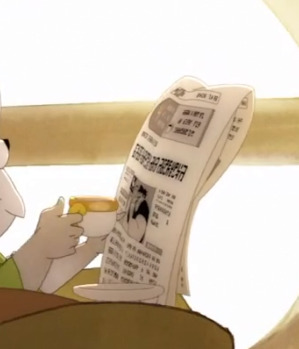
The same text asset as in the previous episode. I really like how good this show is at re-utilizing the art assets and files, by the way.
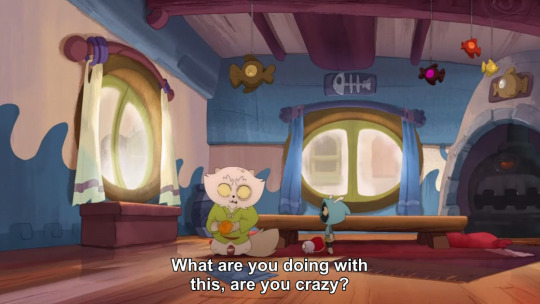
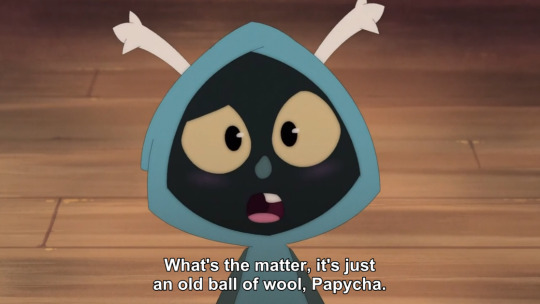
I don't know why this made me laugh so much.
This moment is made funnier by the fact that they have these balls everywhere at home. Everywhere in episode 1 and 2, then in a basket downstairs after that, then, in the movie, yet again, all over the fucking place. Chances are, playing with balls of wool is something Joris does a lot. No wonder he has no idea why Keke's mad at him this time.
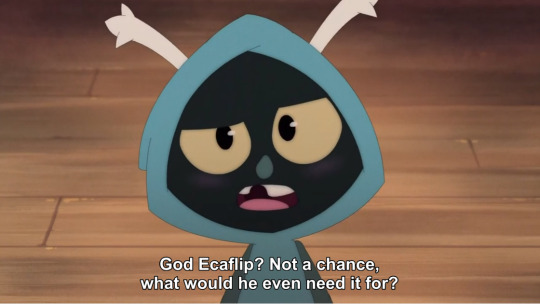
KILL HIM JORIS. I really like that as time goes on he will say this about the most inane things. Buddy, he had a dinosaur tooth, and you're doubting that his orphan ass took a single yarn ball from Ecaflip's collection?

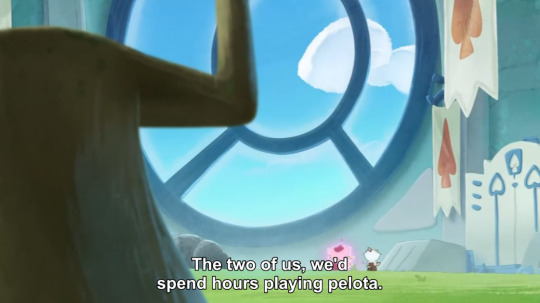
There are all these kids, who are friends, and Keke only plays with Ecaflip. I had said that, probably, being Atcham's brother didn't help him socially, but also,., I do think Ecaflip was isolating him on purpose too.
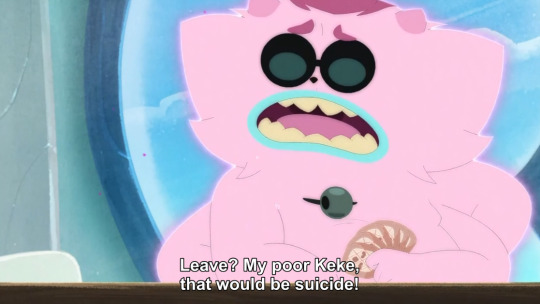
See, when Ecaflip needs Keke to feel awesome, it's "you're the luckiest ecaflip ever", but when he needs Kerubim to need his care and stay by his side, it's "you will Die without me."
I hate this guy.


DUN DUN DUN. None of the other kids even passed the confirmation. And it turns out they weren't meant to pass it to begin with, apparently... Very kind of Ecaflip.
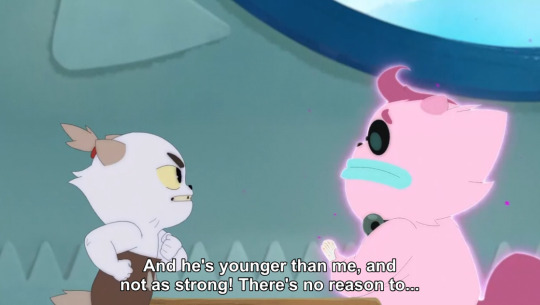
It seems that most disciples are free to leave. Kerubim's the ~Exception~.

...Says the god of cards and fortune, who is characterized by his ability to manipulate luck and results. But did he really? Or is he simply... lying?
One very pointed detail here, is that we are shown the number of the tarot, which is "13", — and that allows us to pinpoint which real world card Misadventure is supposed to represent, to see what it means. So, shall we?

Oh my fucking god. Ecaflip... Cards never lie, but you just disregard what they say anyway!
Here is what the internet has to say on the topic:
The Death card symbolizes the end of a major phase or aspect of your life that you realize is no longer serving you, opening up the possibility of something far more valuable and essential. You must close one door to open another. You need to put the past behind you and part ways, ready to embrace new opportunities and possibilities. It may be difficult to let go of the past, but you will soon see its importance and the promise of renewal and transformation. If you resist these necessary endings, you may experience pain, both emotionally and physically, but if you exercise your imagination and visualize a new possibility, you allow more constructive patterns to emerge.
[...]
Finally, Death is a sign that you need to learn to let go of unhealthy attachments in your life to pave the way to a fuller, more fulfilled life of deeper meaning and significance. Death teaches you to let go of outworn and outgrown ways of life and to move forward from them. This is a perfect card to break a bad habit or pattern of behavior. See this as a time to cut out excess and let go of what is unnecessary for your life. Purge the old belongings, memories and baggage that are getting in your way.
I can't deal with this show anymore. How do I even analyse this, when this being the Death card already says all there is to say about Kerubim's childhood and his relationship with Ecaflip during it?
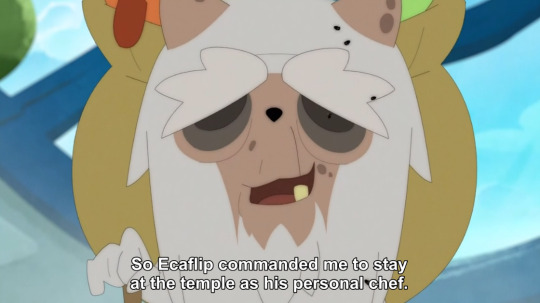
Yes, Ecaflip values the freedom of his disciples. As long as they are not useful to him. If they are... then, well, it doesn't matter what they want.
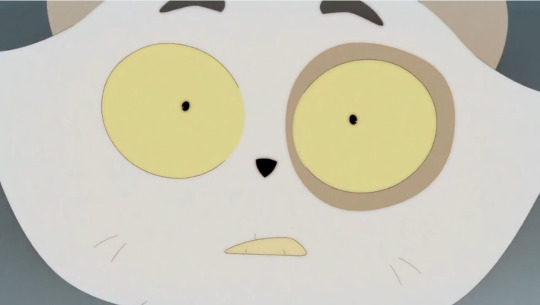
He probably wanted Kerubim to be by his side forever. For centuries. Just in one place, for him to have fun with. And I think that's a very normal thing to be scared shitless of.
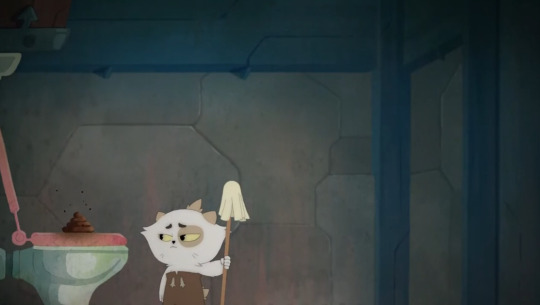
...Orphanage confirmed to have toilers despite the fact that ecaflips can use a litter box. Also it really is such an Ecaflip move, to punish Kerubim for not wanting to be his pet for his whole life.

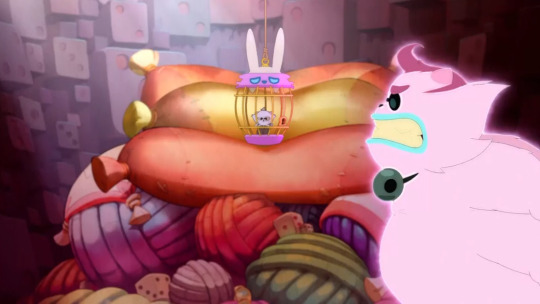
Can the metaphors in this episode get any thicker than this?
Also, the expression "a gilded cage" does exist in French.

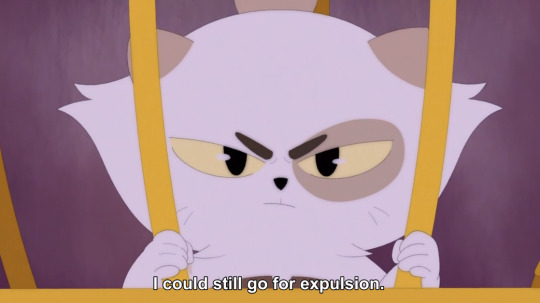
Man, haha, I wonder if he's seen someone get the expulsion from the orphanage before, to give him this idea. I wonder if whoever that was had a name starting with A—— (I am forcibly removed from the stage and medicated.)

Things are that bad. He's being kept here against his will by a guy who plans to do this to him for centuries, and he's forced to mop for him.
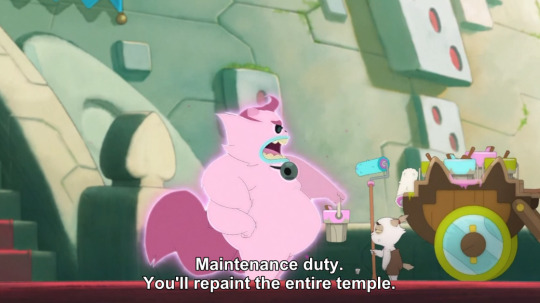
I really do think that it's admirable, that no matter how much bullshit Ecaflip throws at him, Kerubim never loses his willingness to fight for himself, or, at the very least, make himself a problem. He will not go gently into that good night.

Y'know, judging from how often hearts are used in graffiti in this series, I genuinely think they may symbolize something far more risqué, in-universe.
It is a common misconception that, in earlier human history, this symbol was used to represent sexual organs, which may inspire its usage in this context, within the show.
(Apparently it simply doesn't look like a heart to modern people because we usually look at scientific diagrams, instead of like... actual real hearts of animals during butchery and cooking, or human cadavers. Apparently the real thing, without all the veins, is "<3" shaped. Yes, I went on a deep dive for this symbol's history, for this post. You're welcome.)
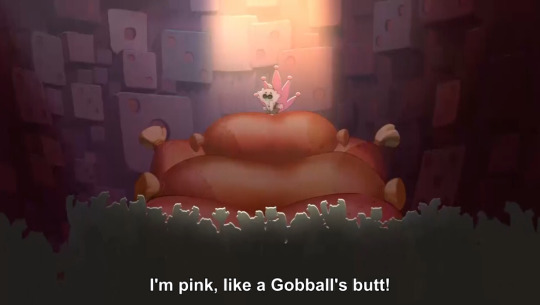
He really is the class clown. We love to see it.
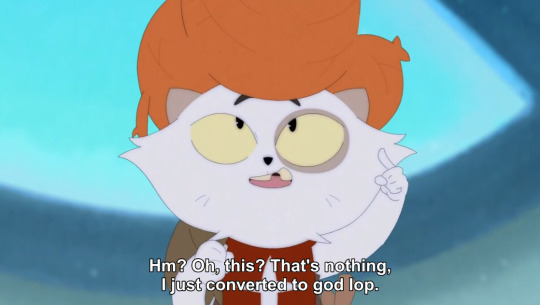
This confirms that, within modern, cartoon-canon, god conversions are still a thing. Though probably very rare.
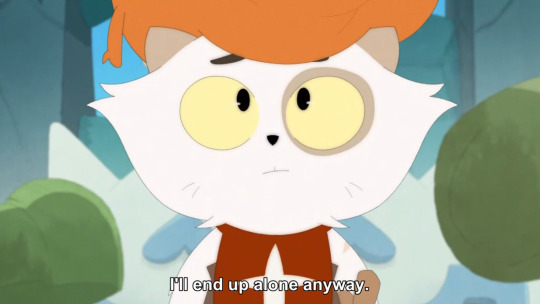
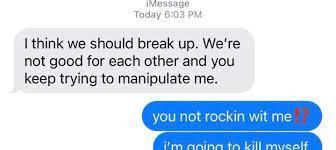
God, Ecaflip's literally that one meme.
Anyway, he was really, really betting on those 600 years of undying immortal codependency he already imagined for him and Kerubim, huh...
But sadly, his personality is too... bad for that. Someone else will get this specific brand of horrific parent-child relationship with Kerubim instead. It will be a very casual Joris Jurgen Win.
(It will also be an instance of Kerubim perpetuating the cycle. But let's not talk about that.)
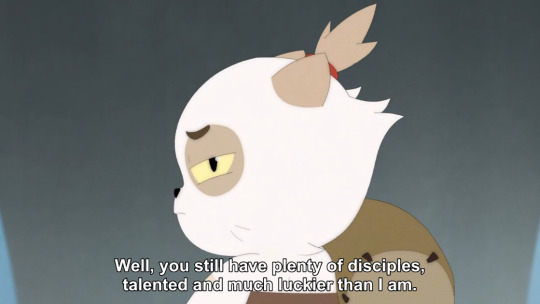
Kerubim is saying this to make him feel guilty, as can be seen from his pout immediately after he says this. But the thing is...

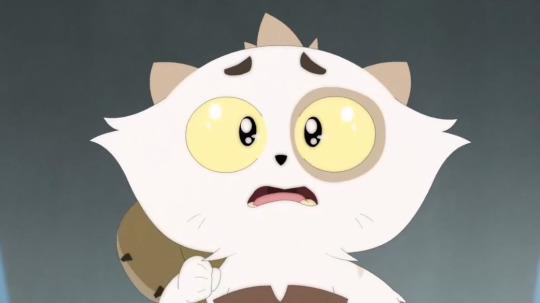
The thing is that if you keep telling someone that they're worthless, so that they stay with you, they will, generally, probably start believing it just a little bit. Even if they don't want to. Especially if they're a child.
He can't hide how much these words actually mean to him.
Is it any wonder his relationship with Lou fell apart because he felt unworthy of her, and it made him fall into gambling addiction, and the glitz and glam of being "successful" and "rich"?
Of course he would develop 20 mental illnesses about this...
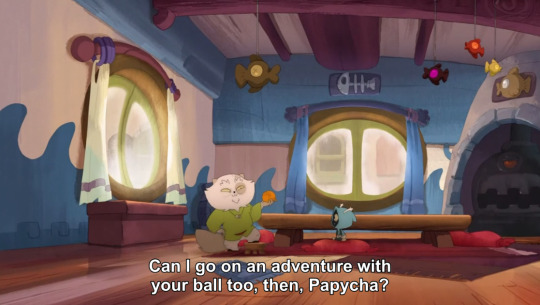
The scariest part of this episode is that Joris recognizes enough similarities between his own situation and Kerubim's (an isolating relationship with a single adoptive parent (Don't forget, Kerubim did have a mortal family once, before the temple, — Ecaflip essentially took him in, despite being his biological father), and said parent insists on being ~Besties~ with you, while you don't really have many, if any at all, friends outside the household. And the household is a very high-stress environment), to clock the relationship between Keke and Eca as a parent-child one.
Even without yet knowing that Kerubim is a demigod.
Man... Kerubim perpetuating the cycle.
13 notes
·
View notes
Text
Improving relationships with others: effective strategies

Positive relationships are fundamental to our well-being and success in life. Whether it's with family, friends, colleagues, or acquaintances, nurturing healthy connections can enrich our lives in numerous ways. However, building and maintaining strong relationships requires effort and skill. Here are some effective strategies to enhance your relationships with those around you:
Active listening. One of the most powerful ways to improve relationships is by being a good listener. Practice active listening by giving your full attention to the speaker, maintaining eye contact, and demonstrating empathy. Avoid interrupting and focus on understanding the speaker's perspective before responding.
Communicate openly and honestly. Clear and honest communication forms the foundation of any healthy relationship. Be open about your thoughts, feelings, and expectations, and encourage others to do the same. Address conflicts calmly and constructively, striving for mutual understanding and resolution.
Show empathy and understanding. Empathy involves putting yourself in someone else's shoes and understanding their emotions and experiences. Show compassion and support towards others, validate their feelings, and offer help when needed. Empathetic gestures can strengthen bonds and foster trust.
Respect differences. Every individual is unique, with their own beliefs, values, and preferences. Respect diversity and differences of opinion, even if you don't agree with them. Avoid judgment and criticism, and instead, focus on finding common ground and celebrating diversity.
Practice forgiveness. Holding onto grudges and resentment can poison relationships over time. Practice forgiveness by letting go of past grievances and moving forward with a clean slate. Forgiveness doesn't mean condoning hurtful behavior but rather freeing yourself from negative emotions and fostering healing.
Show appreciation. Expressing gratitude and appreciation can significantly strengthen relationships. Acknowledge and celebrate the contributions of others, whether through simple thank-you notes, verbal praise, or acts of kindness. Feeling valued and appreciated fosters a sense of connection and belonging.
Set boundaries. Healthy relationships require clear boundaries to establish mutual respect and preserve individual autonomy. Communicate your boundaries assertively but respectfully, and honor the boundaries set by others. Setting and respecting boundaries fosters trust and prevents misunderstandings.
Invest quality time. Prioritize spending quality time with the people you care about. Engage in meaningful activities together, whether it's sharing a meal, enjoying a hobby, or simply having a heartfelt conversation. Quality time strengthens bonds and creates lasting memories.
Be reliable and trustworthy. Building trust is essential for the foundation of any relationship. Be consistent, reliable, and true to your word. Follow through on commitments, maintain confidentiality when necessary, and demonstrate integrity in your actions. Trust is earned through reliability and consistency over time.
Cultivate patience and understanding. Relationships inevitably encounter challenges and obstacles. Cultivate patience and understanding during difficult times, and be willing to work through issues together. Approach conflicts with a problem-solving mindset, focusing on solutions rather than blame.
In conclusion, improving relationships with those around us is a continual process that requires effort, empathy, and effective communication. By practicing active listening, honesty, empathy, and respect, and investing time and effort into nurturing connections, we can cultivate healthier, more fulfilling relationships in all aspects of our lives.
16 notes
·
View notes
Note
thinking about the alicent daemon grooming battle over rhaenyra this fine morning. would love to hear more of your thoughts about it
Hello! Sorry for the delay in this ask, I wanted to properly sit down to answer it.
I believe that Alicent's grooming of Rhaenyra - and I must note, before I get insane hatemail, that I believe this is a *possible interpretation of the text*, rather than absolutely definite canon - is very much a result of how young Alicent is when she's brought into court to be Jaehaerys' companion. Alicent, having been groomed by her father to be Queen, having her childhood and humanity removed until she existed only as an object of House Hightower's ambitions in court, is still a girl when Jaehaerys dies - and at that point, as we know, there's rumours he had a sexual relationship with Alicent, and he mistook her for Saera several times.
She's been dealing with that since she was a child - with the idea of sexual promiscuity as whorish, as unacceptable behaviour even for a royal, and, naturally, the idea that *to prepare someone for royalty and rule is to prepare them to function a specific sexual role*. That is to say, she cannot fathom the idea that raising a child does not accompany all that - because, well, grooming is a socially accepted, even socially *necessary* pattern here. Children are wed when they're still children, they're expected to fulfil a reproductive duty to their family that is constantly reinforced - we can see that in the main books.
When Alicent marries Viserys, she's older than Rhaenyra, but not so much that they don't share a comradery - Viserys is much older than her, and she sees in Viserys the image of her own father. She's now Rhaenyra's mother, and Alicent didn't have a mother to raise her - so she tries to raise Rhaenyra the same way her father raised her, because she sees Viserys as negligent and too permissive.
It's important to note that at this point, the Green and Black conflict is much different; the Greens support Rhaenyra's claim here, because they're more scared of Daemon's wilfulness, and generally believe that Alicent can assert herself over Rhaenyra and bear an heir that would marry her. It is noted in F&B that Alicent and Rhaenyra had pretty good relations before their big split, even.
Alicent, then, finds herself in a position of power over Rhaenyra, and seems to groom her - both sexually, so she can serve as Queen to her own yet unborn child, and literally, so she can rule adequately according to Hightower interests - and in that she finds a new freedom she hadn't experienced yet. Through Rhaenyra, she can articulate herself; she can have new sexual experiences, she can have new outlooks on life, she can free herself from being constantly under Otto's power by essentially taking over Otto's role and becoming him, in some way. Rhaenyra is wilful, and she pushes Alicent to be wilful too - because Alicent doesn't know how to be Queen, and Rhaenyra, even though she's a teen, teaches her that by flaunting her status and power.
These are things that Alicent slowly realises. And while Daemon is away, that's fine - that's the state of their relationship. Alicent is preparing Rhaenyra to be Queen, and Alicent is learning to be Queen *with* Rhaenyra - until Daemon is in court, and Rhaenyra is completely taken by him, because she romanticises it. Because Aegon is still a babe, and Daemon *is* charismatic and he is seductive and manipulative and he knows what he's about and Viserys is in this very difficult situation where he loves Daemon so much more than Alicent, but also puhes back against Rhaenyra's relationship with Daemon - and that makes wilful teenage Rhaenyra want Daemon *more*. Alicent can't offer her anything other than a presumed comfort within the structure, she can't get out of the cage - and the initial Black vs Green conflict is about which one of them gets to sit beside Rhaenyra, and which one of them is reading books with her and who is posting who will be her handmaiden and decide who will sleep with her at her bedchambers.
Ultimately, however, Alicent loses - because she gives up on Rhaenyra when the Velaryons push for the Laenor match, and sees her as no longer the best heir with the possibility of Aegon coming and Helaena too. So that pushes Daemon directly to Rhaenyra's side, and Rhaenyra to Daemon's side, to me - and Alicent is still bitter about it, and feels like she put so much into Rhaenyra that *she* is owed the same kind of loyalty that she showed to Otto, that Rhaenyra should be marrying *her* child so by extension Alicent can marry her in the same way that Alicent married Viserys so Otto could marry him.
And that's the thing. Rhaenyra by this point is a grown woman, who was thrown around between so many people, and Daemon can offer her some escape from being suffocated in King's Landing's court. With Daemon, she can be at Driftmark or Dragonstone and she can have Ser Harwin and nurture a secret affair that fits within the heterosexual boundaries of normative love. With Daemon, there's so much more she can do, because Daemon is Viserys' choice, ultimately.
Viserys gives Rhaenyra to Daemon, and Alicent has to go back to being a victim. And that's where she starts to work on her own children, whom we see develop their own *host* of issues.
16 notes
·
View notes
Text
Nobody really cares anymore (and the irony is that I actually like Civil War pretty well in general) but when I think about the quality of the writing that they offered us for Bucky Barnes, I still get just like. Actively angry.
Here's the setup: Steve is a hero, through and through. This plot requires him to do something that The Powers That Be deem a crime, but we're going to agree with Steve that it has to be done regardless. We need to see his actions not as a betrayal of his heroism, but the fulfillment of it. That's like, the fuckin plot of this Captain America movie: the world's evaluation of what a hero does is flawed, but Steve's isn't, he's Trustworthy (and therefore justified in placing his own moral judgments quite literally above the law). Is it a good idea to tell that story? Idk, very possibly not, but we're doing it! They picked the plot, not me, here we go!
The crime the writers have chosen to stake Steve's character on is that he's going to meddle in an international manhunt for a terrorist. It's against the law, so check. And eventually we learn that Bucky is innocent of this crime, so retroactively Steve's actions feel justified, but crucially at the time he acts, Steve doesn't know that. He's not acting to exonerate Bucky, or even to help him escape; he's interfering explicitly because he thinks law enforcement won't (probably can't, likely won't even try to) take Bucky alive. Steve fully expects Bucky to go to prison forever, he just has this one hope: if he breaks the law, fucks up the op, and gets there first, Bucky might not have to die.
Now, I think that's pretty good, on paper. It's a big swing that Steve takes, even knowing all eyes are already on him as a potential threat due to his unwillingness to sign the Sokovia Accords, and he does it for this incredibly small, incredibly subjective human experience: he just can't bear to see this murderer who used to be his friend gunned down like a dog. After all the help he's failed to give Bucky, he wants to save him from this one final brutality. Good stuff! Works beautifully with the overall theme of Steve's essential humanity and his ability to leverage it in the face of cruelty.
But what the movie obviously really wants isn't to frame this crime as Steve's emotions getting the best of him, because if that's what he's doing, then Tony is effectively right and the Sokovia Accords are fundamentally just -- nobody, not even Steve Freaking Rogers, can be trusted not to do crimes for selfish human reasons. That's what you would need oversight and punishment for. If Steve is just committing a crime because it's good for his friend, then the intractable moral struggle of the movie is solved and Steve is an asshole for insisting that the Accords can only interfere with his ability to act when it's "necessary." It's a Captain America movie, and the writers don't want to do that. So Steve has to be somehow correct to make this call completely on his own, even before he knows that Bucky isn't a terrorist. That's a writing problem!
The only way to solve this is to somehow convince the audience that it's even more wrong for Bucky to die. They have the groundwork laid -- the Winter Soldier is a killer but Bucky isn't, so if the Winter Soldier committed this crime, maybe it's still morally correct to save Bucky's life. And that of course is the angle the movie takes -- for all this to work, we have to believe that there's a Bucky, that he's not the reason any of this has happened, and that he doesn't deserve to pay for what the Winter Soldier is guilty of.
All of this is to say that the existence and nature of Bucky Barnes as a human character is vitally important to this movie. He has to be a person we hope and believe still exists, that we hope and believe is still separate from the Winter Soldier programming, and that we find worth all the massive physical and moral risks Steve takes on his behalf. All of this is to say, nothing matters more to this movie than establishing Bucky's character. It's literally the entire fucking ballgame, story wise and thematically.
And they do a criminally fucking terrible job of that. It's just. It's so bad, you guys. They build in a scene where Bucky has to prove he's himself to Steve -- THE WHOLE POINT, IT'S THE POINT OF THE MOVIE -- and what do they come up with? He knows Steve's mom's name, and a non-specific anecdote about Depression-Era shoe life hacks. Steve's like, oh, nobody could just know that, but 1) of course they could, the first is probably on Steve's Wikipedia page and the second could easily be a lucky guess, and B) this is the movie's One Big Chance to show us some particularity of who Bucky is, who he and Steve were together, why this has all been worth it and will still be worth what's coming up. Whatever Bucky says in this moment should break the audience, it should be so tender or distinctive or brave or poignant or thoughtful or something that we, in that moment, see the person that Steve would do anything for, and we get it. But the writers can't think of shit. They come up with Steve's mom's name.
And it's not an isolated problem. There's another moment right before the fight when they can connect over a shared memory, and again, the writers totally fail to come up with a memory that means something or conveys something or demonstrates something. They went to a carnival and Bucky like, blew all their money on a girl or whatever. But that's an irrelevant story! Bucky isn't being presented as a hothead or someone who never thinks about the future, that's not something the writers are trying to impress on us. None of this happened because Bucky is a fool for love or a hedonist who'd rather have a great night at the carnival than plan for the trip home. I guess those are character traits, but they're not tied to anything in any of the three movies we've seen him in! The story means nothing, at a climactic moment where everything hangs on the question of what Bucky is going to do in this conflict, the question of what kind of person he is.
Everything about Bucky's characterization is slapdash and superficial like that. He likes Steve. He likes fun, I guess. He's a good soldier but didn't really want to be a soldier the way Steve did. He likes Steve. His family seems to like Steve, too. Like, are you fucking kidding me with this? This is Net Zero Information. They are just simply not interested in Bucky being a distinctive person. I as the audience am just supposed to note that Steve likes him and transfer those emotions to my own hard-drive. He's a sexy lamp, and I'm not even attracted to him. He's just there for Steve to have an arc about, and I think it's criminal that over three films and god knows how many writers, nobody bothered to make him worth my emotional investment. He's got like 15 lines across the whole trilogy and they're mostly variations on "I'm Steve's good friend Bucky." I'm sure he is Steve's good friend Bucky, but that has fuckall to do with me! I'm supposed to feel things, I bought tickets to these movies!
It's lazy. It's sloppy. It's corner-cutting and at what these movies cost to make, I don't think they should be cutting corners, it's disrespectful. That shit would never fly in fanfiction.
Anyway I actually like Civil War. I just have to breathe into a paper bag and focus on Spider-Man when I get too exercised about this in particular.
13 notes
·
View notes
Note
The field of economics presupposes finite resources as the basis for its existence and it proclaims itself from a position of that assumption being true and inarguable. And while finite resources has been true for the overwhelming majority of our existence on this planet, since the industrial revolution we have developed means of producing more resources than we need globally and we have the developed the infrastructure to move goods between basically any locations in the world. Essentially, a lot of these technologies and our systems as society was built were designed with the goal of creating a version of our world where we can exist prosperously without having to struggle to survive and we've finally reached that point but by clinging to antiquated ideologies and assuming that their premises are true without challenging them ever we can never actually like deploy on new system to take advantage of the fact that we accomplished our goal. Our society our species accomplished the mission that we set out to do 10,000 years ago and now it's time for a new way of doing things so that we can actually use all of these resources we've figured out how to produce.
The "opportunity cost" of these things is irrelevant. In our current state, we already use systems that produce and deliver the goods needed to the places they need to go. Even with those opportunity costs accounted for
And while finite resources has been true for the overwhelming majority of our existence on this planet
all of our existence*
since the industrial revolution we have developed means of producing more resources than we need globally
Based on what? Your claim assumes a universal understanding and agreement of what we "need" globally, which does not exist. While some regions may have a surplus of certain resources, it doesn't account for variations in the quality of life, access to healthcare, education, and other essential factors that contribute to well-being.
Even if you wanted to narrow your scope and focus to the need of hunger, the amount of resources necessary to fulfill all of the requirements to end hunger have not been determined with any relevant level of certainty. Sure you can do a simple calculation of the amount of food required to feed people, but that does not account for the other necessary resources required to end hunger. For example, in regions affected by violence and instability, it can be extremely challenging and resource intensive to implement effective solutions and ensure consistent access to food.
Essentially, a lot of these technologies and our systems as society was built were designed with the goal of creating a version of our world where we can exist prosperously without having to struggle to survive and we've finally reached that point
Once again, your claim assumes a universal understanding and agreement of this goal, which does not exist. People still struggle to survive today and even if through some theoretical miracle everyone willingly pooled their resources together and worked together, there would still be people who struggled to survive. Additional new resources, improvements, and innovations would still be required.
The "opportunity cost" of these things is irrelevant. In our current state, we already use systems that produce and deliver the goods needed to the places they need to go. Even with those opportunity costs accounted for
No, we don't and it's not even close. There are countless shortages throughout the world for numerous reasons. I beg you to please step out of your comfort zone and realize that not everyone lives in a major urban city. I am not talking about the obvious examples like in poor countries, but there are still places in the US, where people die to the weather, lack of food, lack of shelter, lack of clean water, etc.

7 notes
·
View notes
Text
Here is the Toy Story 4 tea y'all.
My opinion on Toy Story 4 is in the minority, it's the opposite of what literally everyone else thinks about it; I think that Toy Story 4 was a necessary film, I think it was good in terms of Woody's character development and I think people who boil it down to Woody ditching his friends for his (in their words not mine) 'hoe' are missing the entire point of Toy Story 4.
Let me explain myself.
The most relevant argument I see about this film is the 'Woody would never argument; 'Woody would never leave Bonnie', 'Woody would never leave Buzz and the gang', etc. and I'm not going to knock this argument, because at some point this was true. In the first three films, Woody was given the option to abandon his kid or the gang and he chooses to stick with them but there are a lot of differences in Toy Story 1-3 and Toy Story 4 Woody.
For starters, Woody's whole purpose throughout the first three movies is Andy. He wants to be there for Andy, he wants to help him grow, he wants to be loyal and fulfill his purpose which is being Andy's toy. As soon as Andy gave Woody to Bonnie in Toy Story 3 that purpose was fulfilled, as we see in the fourth movie, he doesn't know where to go from that point because up until that point his purpose was Andy and Andy is no longer in his life.
This leads to my second point which is we (the viewers) and Woody himself don't really know who Woody is. Sure, we all know he's a loyal guy who will stick by his friends and yeah, we also know he has a little bit of a by the book kind of guy, but those are all things he has to be for other people. He has to be loyal to Andy, because Andy needs him. He has to lead the toys, because the rest of the toys would be in disarray without him and he has to follow the rules because the rules keep his friends safe.
In all honesty, we have no clue who Woody is in terms of himself and neither does Woody. When Bonnie stops playing with him as much in favour of her other toys, Woody realizes this. He doesn't have a purpose, he doesn't have anything besides the people around him and he starts to realize throughout the film that he needs to start being a little selfish.
Before I go deeper into Woody's character arc let's talk about Toy Story as a whole. I like to think of Toy Story as an analysis of a relationship; particularly the relationship between Woody and Andy, because in my opinion, that is the main relationship in the film.
In the first two films, Woody is tested in his relationship with Andy and he decides to hold firm and loyal to this relationship both times.
In the third film, Andy starts to drift from this relationship and Woody, not ready to let go, holds onto it for as long as possible until at the end he realizes that what he and Andy have can never be the same as it was when Andy was a child. He has to come to grips with this change and he does it with his friends at his side.
The fourth film then is Woody finding himself. As I'm sure anyone who has been in any type relationship they thought was the most important at the time, only to later have it die out would tell you; after that relationship you do a lot of self exploration.
You start to realize who you are outside of that relationship, form new relationships and become a stronger individual.
The same can be said for Toy Story 4; I personally think that even had Bonnie been as invested in Woody as Andy was, the outcome would have been the same. Woody would have left, because when you leave a relationship like the one he had with Andy, you can't replace what you had before and that's essentially what he was trying to do with Bonnie. He was forcing Bonnie in his mind to be the "new Andy" and that's not a healthy way for anyone to live or foster a relationship (even if that relationship is one sided).
So then, if Toy Story 4 is Woody finding himself it makes perfect sense he'd run off with Bo and it makes perfect sense his friends would let him.
Now that he no longer has his loyalty to Andy tying him back, he's starting to put his own wants and needs before others, something everyone has to do at some point. And bumping into Bo, getting a second chance at something he hadn't been able to pursue before, probably accelerated that process.
Buzz, Jessie and the other toys realize that Woody has spent decades selflessly giving himself up for them and Andy, they have been there all along. They know it's a breakthrough that he's finally focusing on himself and being a little selfish. All they want is for him to be happy, much like all Andy wanted was for his toys to be played with at the end of Toy Story 3.
So to basically summarize my thoughts and feelings on Toy Story 4;
I do not think Woody was out of character, I do not feel like it was unnecessary. I don't think it was Bonnie's fault Woody ran away, I don't think Woody was choosing Bo over his friends; I think Woody was choosing himself over his friends and that it just so happened to coincidentally be that the selfish thing he wanted to do to make himself happy was be with Bo because he got a one in a million second chance to be with the one he loves and how often do you get an opportunity like that?
To dispel some other arguments I feel like people will bring up in response to this, I don't care how Andy would feel about all of this. Bro is in college, Woody and the gang aren't his toys anymore, they're Bonnies. Andy doesn't matter anymore, like it or not. He isn't even there.
Andy also would not be mad at Bonnie for this, she's a little kid. In some event where he did find out, he may be mad at himself for giving her the toys but it's not Bonnie's fault Woody left.
Buzz and the gang can do just fine without Woody now. Dolly is in charge of Bonnie's room, so Woody doesn't need to fulfill that role anymore and everybody else still has each other.
Plus, I like to think Woody and Bo visit if they can.
And finally, at the end of the day, yes I know none of this matters because Toy Story's 2-(now)5 are cashgrabs meant to monopolize on your love of these characters. I am aware how capitalism and movie sequels work, but that doesn't mean these movies can't mean something to the people who watch them and that they can't be enjoyed.
And this is what Toy Story in general and Toy Story 4 meant to me. It just kind of sucks to see people shit on it because sometimes, in a way it feels like people are shitting on me. I've been in a position like Woody, where someone I cared about suddenly didn't want me anymore and it sucked, it took a lot of growth and yeah, I ended up leaving a lot of friends who I loved and who I cared about but in order to grow I needed to do what was best for me.
And sure, maybe most people won't see Toy Story 4 as this metaphor, maybe you'll think I'm projecting or that I'm stretching a bit too far and that's okay.
This isn't intended to change your mind, only show you a different perspective. I hope it at least was an interesting read. And yeah, I'm a 22 year old guy who thinks way too critically and deeply about cartoon toy movies.
It's the autism, innit? /j /lh
Either way you wanted it, so who's really the weirdo here? /j Feel free to ask for clarification, I tried to organize this into coherent thoughts but sometimes my brain works faster than my hands and things get lost.
#milo infodumps#toy story#toy story 4#woody#disney#pixar animation studios#sorry for the essay but i have THOUGHTS#and i've always been too scared to properly put them out#but i've been spicy recently
27 notes
·
View notes
Note
i’m not sure if you’ve talked about this before so my bad if you have, but i thought this tweet as interesting and feels like yet another nail hammered into aeon’s coffin by the game itself: https://x.com/JENITOP1A/status/1722002324431008122?s=20
If this interpretation holds up, I'm even happier that I got that design tattooed on me LMAO
But yeah this is very THINGS ARE DIFFERENT NOW. THE CHARACTERS ARE DIFFERENT.
The moth symbolism sounds a lot like the Death card in tarot. This is a good description I've found:
The Death card symbolizes the end of a major phase or aspect of your life that you realize is no longer serving you, opening up the possibility of something far more valuable and essential. You must close one door to open another. You need to put the past behind you and part ways, ready to embrace new opportunities and possibilities. It may be difficult to let go of the past, but you will soon see its importance and the promise of renewal and transformation. If you resist these necessary endings, you may experience pain, both emotionally and physically, but if you exercise your imagination and visualize a new possibility, you allow more constructive patterns to emerge.
Similarly, Death shows a time of significant transformation, change, and transition. You need to transform yourself and clear away the old to bring in the new. Any change should be welcomed as a positive, cleansing, transformational force in your life. The death and clearing away of limiting factors can open the door to a broader, more satisfying experience of life.
[...]
Finally, Death is a sign that you need to learn to let go of unhealthy attachments in your life to pave the way to a fuller, more fulfilled life of deeper meaning and significance. Death teaches you to let go of outworn and outgrown ways of life and to move forward from them. This is a perfect card to break a bad habit or pattern of behavior. See this as a time to cut out excess and let go of what is unnecessary for your life. Purge the old belongings, memories and baggage that are getting in your way.
This is different from Ada's symbolism, which is probably best explained with the Star card:
As The Star follows The Tower card in Tarot, it comes as a welcome reprieve after a period of destruction and turmoil. You have endured many challenges and stripped yourself bare of any limiting beliefs that have previously held you back. You are realizing your core essence, who you are beneath all the layers. No matter what life throws your way, you know that you are always connected to the Divine and pure loving energy. You hold a new sense of self, a new appreciation for the core of your Being.
[...]
You may also want to find or rediscover a sense of meaning, inspiration, or purpose in your life. You are making some significant changes in your life, transforming yourself from the old you to the new you and, in doing so, you are bringing about a fresh perspective: “Out with the old and in with the new!” You are choosing the highest version of yourself. This is a profound spiritual journey that will bring greater meaning and purpose into your life and will renew your inner energy. Strip back any limiting beliefs, facades, or deceptions, and live in your authentic nature. Be open to new ideas and growth, and listen to the still voice within.
It really follows what we've been saying for a long time here, in that they hold each other back. Ada made Leon's life miserable, and he has to let go of what she's done to him to move forward. And if Ada sheds her connection to him, she'll become a better version of herself.
7 notes
·
View notes
Text
youtube
Copied from the transcript:
“Beginning with the first essential concept for a library economy, usufruct refers to the freedom of individuals or groups in a community to access and use, but not destroy, common resources to supply their needs. This is as opposed to the limitation of access based on exclusive ownership.
“Libraries allow you to access and use books when you need them and encourage all of us to be good stewards of the books we borrow, taking care of it when we have it and returning it when we’re done, because it belongs to all of us and should be readily available for use. Imagine this principle applied to libraries of decor, libraries of furniture, or libraries of tools. Perhaps you would borrow cushions, couches, and paintings to suit one interior design taste for a few months before switching it out and trying a new style. You might borrow a shovel from the tool library to get a permablitz done one weekend and return it when you’re done so someone else can use it when they need it. Alternatively, you can keep it for as long as you want to use it. All without having to produce excessively or leave stuff wasting away in storage.
“If we want to live sustainably, we need a library economy. We need an economy based on usufruct that incentivizes producing enough lasting, durable stuff that everyone can share and use when they need it, instead of producing around planned obsolescence and excess, wasting crucial time, energy and resources. A library economy would be an essential component in a move towards degrowth.
“The second essential concept for a library economy is the irreducible minimum, which is the guaranteed provision of the means necessary to sustain life, the level of living that no one should ever fall below, regardless of the size of their individual contribution to the community. This includes access to adequate food, water, shelter, clothing, education, and healthcare.
“Libraries as they exist now provide free access to knowledge, but knowledge is only one component of an individual’s and a community’s self-actualisation, which a library economy should be organised to help reach. Libraries of consumables like food, drugs, and toiletries may be difficult to imagine, which is why in addition to libraries of things, a library economy should also have dispensaries of necessities. Farming cooperatives, in collaboration with cooking collectives, could work to ensure the entire community is provided with a range of healthy food options from the local and regional gardens, farms, and food forests. The popular assembly could organise with building cooperatives to establish a range of housing options to accommodate the needs of each and every member of the community. An emphasis on slow fashion, by a broad and diverse network of designers and tailors, as opposed to fast fashion, would ensure that everyone’s wearing clothing that lasts in the styles that they like.
“A library economy would require a vast reorientation of our priorities from the centrality of capital and competition to the centrality of humanity and cooperation, which brings us to the final core concept for a library economy: complementarity.
“Some people are abled, some people are disabled. Some people are bakers, some people are shoemakers. Some people will farm and some people will sing. People will have a say in how they labour and how they leisure. None of them need to be defined by or limited to the things that they do, but all should find joy or satisfaction or accomplishment in the things that they do for the sake of doing them.
“Together, we will have all the bread, shoes, veggies, and songs we could ask for. And for the things that no one enjoys, as I said in my video on a post-work society, we can find ways to rotate, gamify, or transform the tasks that need doing to make the drudge less drudgerous.
“A library economy should be based upon a complex social ecosystem that fulfills the many necessary roles a society needs filling. Complementarity is a way of looking at non-hierarchical differences within a society as something generative, where each person contributes a small part to an outcome greater than the sum of its parts. Complementarity can be found within communities, ecologies, technologies, and even typical libraries, both in the relationship between libraries and their patrons and in the roles that libraries fulfill, such as research, information architecture, and collection management. Our approach to nature must similarly be based in complementarity. Rather than maintaining an antagonistic, dominating relationship with first nature, we should strive to find a complementary melding of first and second nature, generating a third nature that is reciprocal and sustainable."
...
“Now imagine what a world based on a library economy would look like. Perhaps it would draw some inspiration from the 5 Laws of Library Science, first conceived by Indian librarian S. R. Ranganathan in 1931.
“The first law is that books are for use. Things are meant to be used, not hoarded. Made accessible, not shut away. Preservation and storage are important, Ranganathan himself noted, but more important than that is that consideration is paid to access-related issues, such as location, hours of operation, comfort, and the quality of service.
“The second law states that every person has their book and the third law declares that every book has its reader. Applied more broadly, this means that we should strive to develop a broad collection of things, whether furniture, decor, books, vehicles, or housing that would serve a wide variety of needs and wants, no matter how niche, understanding that those sorts of accommodations are generative of abundant life.
“The fourth law says that we should try to save the time of the user. Libraries require a lot of coordination and effort to maintain, even more so if we intend to apply their concepts upon broader society. Thus, it is vital that we develop systems, services, applications, workflows, guides, and frameworks that allow us to most efficiently manage the resources of the libraries, allowing us to do more with less.
“Lastly, the fifth law reminds us that a library is a growing organism. The aim of a library economy should never be to rigidly establish itself and continue as is. A library economy must be dynamic, ever growing, and evolving in both the quality of the collections held and services provided and in the quantity of those who are effectively served. The project is never complete.”
#Youtube#library#library economy#socialism#communism#anarchism#private property#biopic#theory#resources#reaux speaks#educational equity
57 notes
·
View notes
Note
Shattered Glass has stolen my entire amount of focus.
Because my mind went to part 3 and- essentially the less evil versions of DIO's minions I'm cackling-
...but... Angst ideas because... yeah.
Since it's the rebuilding of the empire but with Stands... there has to be consequences, right?
...Holly Dies because of the arrow.
Iggy was a test for whether animals could get stands. ...he promptly escaped.
Also...
Could. Could the pillar men get stands in this since they probably survive part 2?
-👾
Y e s s s s s s s s s s s
and just. God the Joestar family in this AU give me so much brainrot. Because if you want to get technical, really only Jonathan had truly chosen to be evil. George II, Joseph, Holly, Jotaro, all of them could've been good people but the environment they were in forbade it. Since the second they were born they were being moulded to be The Next In Line, to be the next successor to continue the family legacy. Anything else was stamped out as quickly as possible
and just. Holly dying would be a mix of nothing and everything to Jotaro. Joseph would tell him her death was necessary, that if they didn't they wouldn't be able to rise to power again, that it's her own fault for being too weak......... and Jotaro would agree
but at the same time, he wouldn't
Jotaro loved his mother. He had to, he had nobody else. His grandfather was bitter and angry, his grandmother was barely any better, his father had left the second he realized who his wife was and may or may not be dead, and Jotaro had no friends because they needed to stay hidden and untouchable
He thinks she might've loved him back too
and out of all his family members and the people his family worked with, Holly always seemed the most affected by what they were doing. She was abnormally kind soft his grandfather would spit for the life they lived, and while she wouldn't hesitate to do what was needed she never seemed to take joy in it. She was simply..... indifferent. She wasn't nice, and she had more than her fair share of blood staining her hands, but in the quiet moments when they were alone and it was just the two of them, she felt kind. She'd tell him stories, show him fun tricks with Hamon, and hold him like he was the most precious, important thing in the whole world
Jotaro knew he was going to be powerful when he was older. His grandfather always said so, talking about how he was going to take over their fallen empire and bring it to new heights. And Jotaro decided he was going to do whatever it took to keep his mom happy and safe. Whatever she asked of him he would fulfill, and he would carve out a safe place for her with his own hands if he needed
She was soft and weak and he was big and strong. She'd protected him for his entire childhood, so now it was time for him to return the favor
but then she dies. It was her fault, yes. If she'd been stronger she wouldn't have died. Weakness had always disgusted him and yet.......
he thinks he hates his grandfather for talking about his mother like that
(weeks, months, years later when he witnesses Joseph's death by Dio's hands, Jotaro can't find it in himself to be upset the man is gone)
so he wants to find a way to fix it. A way to bring his mother back so she could live in the perfect world he wanted to make for her where the two of them could be happy together
and this desire ends up bringing him to Florida to meet a certain priest
(as for the Pillarmen....... I'll admit I'm not fully sure about their fates. Wammu is probably going to die, but I'm not sure about the others. I'm...... not even fully sure what they'd do if they did stick around to be honest)
#god this au has so much angst and it's just <3333#shattered glass#jjba#jojo’s bizarre adventure#battle tendency#jjba part 2#stardust crusaders#jjba part 3#jjba jotaro#jotaro kujo#jjba joseph#joseph joestar#jjba holly#holly kujo#jjba dio#dio brando#jjba pucci#enrico pucci#jjba wamuu#wamuu#jjba iggy#iggy#sb answers#👾 anon
21 notes
·
View notes
Text
ISLAM 101: Spirituality in Islam: Part 195
Chila (Suffering)
Denoting abandonment of all (worldly) pleasures and delights, and the affliction and hardship one bears when overcoming corporeality, chila (suffering) is used to express an initiate’s spending at least forty days in strict austerity and self-discipline in the name of spiritual training. During this period, initiates keep to the absolute bare minimum in meeting such bodily needs as eating, drinking, sleeping and speaking, and spend most of their time in worshipping, mentioning God, thinking and self-supervision. As if they had died before dying, they concentrate on death and are annihilated with respect to their carnal self and prepares for a new, spiritual life with the necessary endowment to be persons devoted to God.
Dervishes spend the period of suffering either in a silent corner of a dervish lodge or in a quiet room in their homes. Associated with austerity and even serving to fulfill some of its functions, suffering is an attempt to gain nearness to God or an active expectation of meeting with Him in the spirit. The original word used, chila in Persian and arba’in in Arabic, means forty, because such a period lasts at least forty days, although it may last less or more than forty days. It may even occur that the dervish feels obliged to suffer the whole life long in order to surmount the animal aspect of his or her nature. Regarding all hardships that dervishes suffer in God’s way as His precious gifts, they like life more as its griefs and hardships increase, and they welcome afflictions in the delight of living a conscious, deeply felt life. Some people of the heart consider misfortunes as Divine favors presented in that form, and desire more. Fuduli expresses his thoughts in this respect in the voice of Majnun as follows:
Never reduce Your grace on people of affliction;
That is, make me addicted to more and more misfortunes.
Jalal al-Din al-Rumi likens suffering and afflictions to a guest knocking on our door every morning and stresses that the dear guest should be welcomed and entertained:
Every moment a grief comes upon your heart like a dear guest.
When that emissary of grief visits you, welcome it as a friend;
In fact, it is not a stranger to you, for
You and it are acquainted.
Ibrahim Haqqi voices the same thoughts, dressing them in the style of his age:
If grief and melancholy come upon your heart,
Suffer it and know that it is acquainted with you.
If anything occurs to you from the Truth,
Accept it with warm welcome.
Sorrow is a guest, entertain it, so that
God may find you welcoming every misfortune.
…………
Hold not back from affliction so as not to become unmanly;
Many people relying on God are happy with affliction.
Ashrafoghlu Rumi[1] advises that poison should be accepted as if it were honey or sugar:
Ashrafoghlu Rumi, this is what behoves those who love the Beloved,
They should swallow poison as if it were sugar for the sake of the Friend.
In this way, it is essential to be very welcoming toward misfortunes, and to welcome with the same contentment whatever comes from God-good or bad, happiness or suffering. Moreover, there are some other principles which dervishes should observe during certain periods of suffering that they spend in retreat.
Suffering, which usually lasts for forty days, is the most direct way for travelers to God who are in pursuit of lofty ideals to purify their minds and hearts and to deepen in thought and feelings in consideration of the world beyond, and to rise to the level of life in the horizon of the heart and spirit where they will share the same aura with spiritual beings. Suffering exists in all the heavenly or unheavenly religions and religion-like spiritual systems; it is necessary in order to discover the innate power of the spirit. But here we will not discuss that aspect of it, which rather concerns mystical movements and parapsychology.
Muslim Sufis base their consideration of suffering on the forty days which the Prophet Moses spent on Mount Sinai before being addressed by God (see, the Qur’an 2:51; 7:142). They also refer to the forty years the Children of Israel had to spend in the desert of Sinai as a punishment for their refraining from fighting and as a preparation for their future life. In Christianity, there is the time of Lent (a period of forty days before Easter), which shows that suffering is common to almost all religions and religion-like systems. Furthermore, even if it only lasts ten days, retreat into a mosque without going out during the last ten days of Ramadan for the purpose of more devotion can also be considered as having some relation with suffering.
In the Muslim, Christian and Jewish worlds, and in different schools of thought in Islam, there have always been retreat and seclusion for the purpose of spiritual refinement and training. While such refinement and training have been performed in special rooms of retreat and seclusion, called houses of suffering, followers of others religions have performed the same in the seclusion of their places of worship.
Dervishes are taken into a retreat or a house of suffering by their spiritual guide. There they live alone, eating, sleeping, and speaking little, and spending most of their time in worship. They hold themselves under strict control and self-supervision, continuously breathing life into the heart, and traveling in the mind between their inner world and the outer world. Wholly dedicated to attaining a purely spiritual life, they try to feel the Lord with all their being and to see beyond the door half-opened on the heart. Endeavoring to discern and attain unity, they fear missing any signs of the Divine manifestations that may dawn on the hills of the heart. They express the limits of their capacity and the insufficiency of their will-power with sighs of poverty and helplessness, and become more hopeful with their reliance on the limitless Power of the Truth. When left with no means at all, they expect to be surprised by the opening of a door, and unburdens themselves to their Lord, Who sees everything, in the manner of a poor beggar, saying:
Be kind to me, O my Sovereign, do not abandon favoring the needy and destitute!
Does it befit the All-Kind and Munificent to stop favoring His slaves?
As long as they grow in knowledge and love of God, they deepen in relationship with the Lord, and devote themselves wholly to feeling and thinking of Him. Keeping the satisfaction of their essential needs to the barest minimum, and overcoming their corporeality, they become confidants of heavenly beings in their states, attributes and being, and begin to breathe the breezes of friendship with the Sovereign.
Although suffering always takes on the same form, dervishes experience it differently according to their capacities and their powers of resistance. Some are almost completely freed from corporeality and worldliness, and are content with extremely little to meet the essentials of life, spending all their time in worship, thinking and mentioning God. Some others try to live consciously every hour, minute and second, letting no part of life pass without an effort to attain His nearness. Hours pass, weeks follow one upon another, and hunger, thirst and other hardships continue, without any sign of ending, but a dervish who has been accustomed to suffering as a way of life never desires the periods of suffering to come to an end. However, when the first period of forty days ends, the guide investigates to see at what stage the dervish is. The guide looks into the heart of the individual or reflects upon any dreams or visions reported. If the dervish has reached the point of being able to lead a life at the level of the heart and spirit, the guide will then put an end to the period of suffering with certain ceremonies. But it is always possible that new periods will be assigned if the guide considers that the dervish still needs more suffering in order to complete the spiritual purification.
In addition to the Mawlawis-followers of the Sufi order attributed to Mawlana Jalal al-Din al-Rumi-Persians, Azerbeijanis and even some Baktashis-followers of a Turkish mystical order-have ceremonies of their own for suffering. To whatever spiritual order or way a dervish belongs, the purpose of suffering is that travelers to God should purify themselves, discover their inner world and advance toward new horizons through the steps that are to be taken during the spiritual journey, leading a life at the level of the heart and then deepening through their other innermost faculties, such as “the secret” and “the private,” and “the more private,” observing their relations with and duties to the guide, perceiving the significance of obedience to orders, and endowing their spirit with humility and a feeling of nothingness, sincerely adopting the principle of being a simple human being among the people. This is what the guides, who teach dervishes suffering, and the dervishes who suffer, are seeking and what they expect from suffering. The final goal is to become true, perfect human beings.
However, it is not inevitable that one must suffer a certain period in order to attain what is expected from suffering. It is possible to obtain the expected result by abstention from doubtful things, being content with the pleasures inherent in the lawful sphere under the supervision of a guide who has truly succeeded God’s Messenger, upon him be pace and blesssings, and who has achieved the degree of great sainthood, by the acknowledgment of one’s innate poverty and helplessness before God, by thankfulness to Him, by zeal in serving His cause, and by exceptional piety, abstinence, and sincerity. What is absolutely essential in this way is that we should not approach the forbidden things, we should be careful about doubtful things, and we should benefit from the lawful only to the extent of what is necessary.
For those who succeed the Prophets, suffering is, rather than preoccupation with worship and the recitation of God’s Names in seclusion, and the abandonment of an easy life for the sake of torment, the pursuit only of God’s good pleasure and approval, always being aware of God’s company even while among people, arousing in hearts zeal for worshipping God with sincere Islamic thoughts, feelings and attitudes, representing Islam in daily life in the best way possible, stirring up Islamic feelings in others, and by developing in others the desire to believe. This is the way of the Companions.
Suffering in this sense becomes, beyond our own spiritual progress, the dedication of our lives to the happiness of others in both worlds and living for others. In other words, we should seek our spiritual progress in the happiness of others. This is the most advisable and the best approved kind of suffering: that is, we die and are revived a few times a day for the guidance and happiness of others, we feel any fire raging in another heart also in our own heart, and we feel the suffering of all people in our spirits. Rather than only being aware of selfish considerations, such as “One who has not suffered does not mean what suffering is,” we groan with the afflictions and pains which others in our immediate and distant surroundings endure.
Actively expecting (exerting the necessary efforts for) the subsidence of the storms of denial and heresy is a great suffering, while enduring with humility and grace life among rude and ignorant people in order to enlighten them both mentally and spiritually is double suffering. The struggle with the cruel people who take belief in and submission to God as a sport and who reject Islamic values is suffering upon suffering. Finally, in an atmosphere where all the causes of suffering already mentioned exist, and where friends are unfaithful, where time and conditions are pitiless, where troubles are numerous, where cures are extremely scant, where enemies are powerful, and where the wheel of events turn in the opposite direction, to always breathe in the atmosphere of the Truth while having to live every moment of life as if sipping poison is the greatest of sufferings. All of this will help travelers to God to reach the final point in a very short time.
Those who suffered the most in this sense are the Prophets, and on their right and left are the pure, verifying scholars who succeed them and the saints. The hadith, Those who are subjected to the greatest afflictions and suffering are the Prophets, and then come others (according to the depth of their belief)[2] indicates this fact and reminds us that the intensity of suffering is directly proportional to the resistance of the sufferer.
There are few who really suffer in the sense that has been discussed here. It is not genuine suffering that people are subjected to in daily life. Those who really suffer feel suffering and bear it in their private worlds. It cannot be shared by others. The Prophet Joseph, upon him be peace, whose suffering began when he was cast into a well, experienced suffering doubly in a foreign county when he was sold as a slave and thrown into jail, and left among a people who had a different culture and language, and who did not sympathize with him. The suffering he experienced purified and perfected him in the name of his mission as a Messenger; and God made him nearer to Him. The Prophet Adam bore his suffering with tears, and Noah had to breast terrible disasters and destruction, while Abraham, whom God took to Himself as an intimate friend, always had to travel in rings of fire. The Prophet Moses, whom God addressed directly, struggled fiercely against the rebellion of brute force. Jesus, a pure spirit from God, called people to God under the fatal shadows of the gallows. And finally, the master of creation, upon him be peace and blessings, suffered all that the other Prophets and Messengers suffered. He wept tears, groaned and burnt inwardly for the salvation and happiness of others, but without displaying any sign of suffering.
Hundreds of sufferers from the first day of human history have tasted the pleasure of suffering for the salvation and happiness of others in both worlds in utmost submission to God and have been wholly dedicated to the life of others, without ever considering that they have been made to experience the greatest of sufferings. More than this, they have welcomed such suffering and have been intoxicated with the pleasure thus received.
Suffering of thought is also another great suffering. Thinking, leading others to think, setting themselves to solve the severest problems and world-heavy enigmas, including that of existence, is a form of suffering. Thought does not yield, but rather builds bridges between and composes the Divine Revelation and human thought, presenting to “hungry” and “thirsty” hearts and minds the pure extract produced from this composition. This is the suffering in which the heroes of suffering, who are as sincere as angels and who have followed the Messengers, have found an antidote for poison in the poison itself, peace and coolness in the fire, having experienced such with the greatest pleasure. Such people are fortunate that there is no end to their periods of suffering; they cannot be pleased with the idea that such suffering is bound to come to an end. If you attempt to take them out of gardens of suffering, you will not be able to do so; if you were able to do so, you would extinguish their fire and leave them to die.
It is this suffering which is the purest source that feeds the spirit of a true dervish, and which is the most powerful means for travelers to the Truth to reach eternality.
Our Lord! In You we trust, and to You we turn in contrition, and to You is our homecoming. Our Lord! Pour out upon us patience, and set our feet firm, and help us to victory over the unbelievers. And let God’s blessings be upon our master Muhammad, our leader, and on his family and Companions, who were the patient and faithful.
[1] Ashrafoghlu ‘Abdullah Rumi (d., 1484) was a Sufi scholar and poet who lived in Iznik in the North-Western Turkey. He was taught by Haji Bayram Wali in Ankara and Husayn Hamawi in Hama, Syria. He wrote several books, the most well-known of which is Muzakki’n-Nufus (“The Book Which Purifies Souls”).
[2] Al-Tirmidhi, “Zuhd,” 57; Ibn Maja, “Fitan,” 23.
#allah#god#islam#muslim#revert#convert#convert islam#revert islam#reverthelp#revert help team#help#islamhelp#converthelp#how to convert to islam#convert to islam#welcome to islam
3 notes
·
View notes
Text
Marvel Thor AU idea, the whole test of character element of Mjolnir and worthiness is actually an unintended consequence and the enchantment Odin laid upon Mjolnir for the Worthy May Wield was actually Odin being pragmatic and fully intending on having someone else fulfil Thor's role if necessary
consider the idea that at the time, Thor was really going through it and was just vanishing for REALLY long periods of time, possibly having some kind of breakdown or crisis of character. He wasn't present in Asgard nor Midgard to protect people from the threats what need a good smashing, so Odin got to thinking and came to a conclusion.
They needed A Thor. It didn't have to be his son. It just needed to be someone strong enough to fulfil the role. So if Thor one day didn't come back, they needed someone who could do his job.
Now, writing wise, I would have it done ambiguously, so that you COULD read Odin as having done it in a callous way, or that it was something he didn't do lightly; that he DOES love his son and didn't like the idea of having him replaced, but thought it needed to be done.
Either way, the enchantment's intention was to bypass the normal restrictions on wielding Mjolnir and ensuring that whoever WAS worthy to lift it (that is, suitable from Odin's perspective to do the sort of things he needs Thor to do) would essentially BE Thor, with all his powers and strength. This way, you didn't need to be strong enough, this would make you strong enough to wield it.
So a lot of Marvel specific idiosyncrasies with Mjolnir is an unintended consequence of an initially simple enchantment; the trick of it is that ONLY being wielded by the worthy meant that it physically couldn't be moved even by someone who normally would be strong enough to use it. As it so happened, Thor (incarnating into a mortal life, possibly entirely on his own) resolved his conflicts and became the protector of Midgard once more, claiming Mjolnir as he once did.
Thus, the apparent test of character that Thor interpreted this as MIGHT be Odin going '...yeah, sure, let's go with that' but it almost might have been him planning it as a potential outcome, though one he didn't consider likely.
6 notes
·
View notes